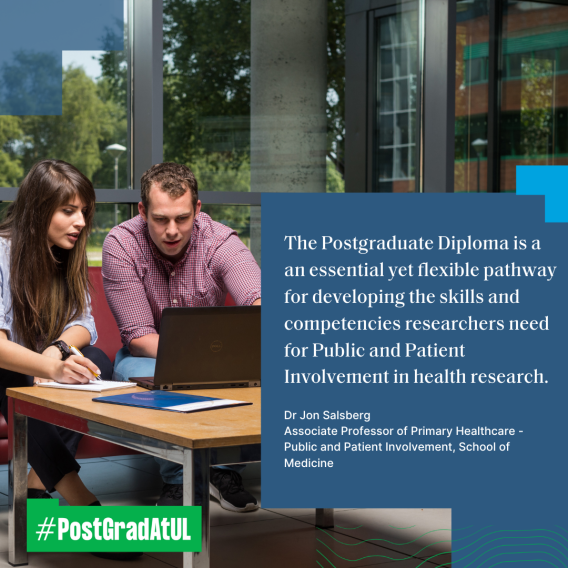
Course Details
Contact(s):
Apply Now
Read instructions on how to apply
Express InterestRegister your interest here for more information or to be notified when applications are open.
Brief Description
The Professional Diploma in Participatory Health Research is intended for existing research or clinical professionals who are seeking the additional qualification (knowledge, competencies and skills) to employ participatory processes in their research. This is particularly relevant for those wishing to meaningfully involve patients, carers or other members of the public in their research. It is also relevant for professionals working in NGOs, as well as health service planners
Participatory Health Research (PHR) is defined as the co-creation of new knowledge by researchers working in equitable partnerships with those affected by the issue under study or those who will benefit from or ultimately act on its results. High quality PHR is about active and meaningful engagement with patients, carers, health care professionals, charities, community organisations and other members of the public throughout all stages of the research process, in order to create action and change benefitting both the immediate partners and the wider community.
This Professional Diploma in PHR is intended for existing research or clinical professionals who are seeking the additional knowledge, competencies and skills to employ participatory processes in their research. It is also relevant for professionals working in NGOs as well as health service planners.
Over the course of this part-time, one-year, Level-9 programme, students become acquainted with the theories, methods and tools they will need to undertake high quality PHR. This will include a comprehensive survey of literature and methods, exploration of participatory approaches within a wide variety populations and clinical and community settings, and critical consideration of ethical, power and equity issues inherent in this approach.
The general flow for the programme is online weekly asynchronous assignments (ie, at your own pace, but completed by the end of each week). This is punctuated by 1-2 online synchronous periods per module, where students all come together (online) for 2 hours to do an exercise. And once per month, there is the live (online) tutorial session for working together on progressing your research projects and dealing with any issues that arise.
There are two in-person/on-campus training blocks, one in the Autumn and one in the Spring/Summer to coincide with the Public & Patient Involvement Summer School. The Autumn block is 2 days (Thurs-Fri) on campus in week 7. The Spring Summer block will be 4 days, 2 for methods, 2 for the Summer School. These will be Tues-Fri, 18-21 June 2024.
This programme is practical, offering students the opportunity to design a participatory project over the course of the year. This allows students to experience the building of partnerships with community and PPI contributors and codesigning research within a meaningful collaboration. Upon completion of the programme, graduates will have equipped themselves with the knowledge, competencies and skills they will need to succeed at a career in participatory health research.
The Professional Diploma Programme is delivered as a blended learning course, with the majority of learner interaction taking place online, both synchronously (together) and asynchronously (at their own pace). This is punctuated with one on-site training block in Limerick in each semester (total of 2 blocks). Engagement with patient and community voices throughout the course (via co-designed content and co-delivered lectures and workshops) will offer students a unique and relevant opportunity to ‘learn as they will practice’ in collaboration with those their research will ultimately benefit. Students will bring their real-world research or clinical problems to the programme and will, throughout the course of the programme, co-develop participatory, patient/community-involved solutions.
|
Year 1 |
|
|
|
Autumn Semester |
Spring Semester |
Summer Semester |
|
BM5053- INTRODUCTION TO PARTICIPATORY HEALTH RESEARCH FOR PUBLIC & PATIENT INVOLVEMENT (6.00 ECTS)
|
BM5056- METHODS IN PARTICIPATORY HEALTH RESEARCH II (6.00 ECTS) |
BM6033- PUBLIC AND PATIENT INVOLVEMENT TRAINING SCHOOL (3.00 ECTS) |
|
BM5055- METHODS IN PARTICIPATORY HEALTH RESEARCH I (3.00 ECTs)
|
BM6032- ADVANCED PARTICIPATORY HEALTH RESEARCH (6.00 ECTS) |
|
|
BM5054- PPI RESEARCH PROJECT AND TUTORIAL (6.00 ECTS)
|
|
|
Applicants must normally have a first or second class Level 8 honours degree (NFQ or other internationally recognised equivalent) in a relevant or appropriate subject, or equivalent prior learning that is recognised by the University as meeting this requirement. Applicants must also satisfy the English Language Requirements of the University. Garda Vetting required only in cases where individual proposed practicum involves children or vulnerable communities. The University reserves the right to shortlist and interview applicants as deemed necessary.
What to include with your application
- Qualification transcripts and certificates
- A copy of your birth certificate or passport (long document)
- If your qualifications have been obtained in a country where English is an official language this will suffice
-
If this is not available, the following additional documents must be provided:
• English translation of your qualification(s)/transcripts
AND
• English language competency certificateFor more information Click Here
EU: €4,000 per annum
Non EU: €8,000 per annum
Further information on fees and payment of fees is available from the Student Fees Office website. All fee related queries should be directed to the Student Fees Office (Phone: +353 61 213 007 or email student.fees.office@ul.ie.)

Still Curious?
The team from the Faculty of Education and Health Sciences regularly host and take part in webinars to support future students. If you would like to learn more or ask questions at an online information session, click below.
Graduate and Professional Studies
+353 (0)61 234377
University of Limerick, Limerick, Ireland
Contact Us | Download Prospectus | Sign up to stay informed | Quality and Feedback